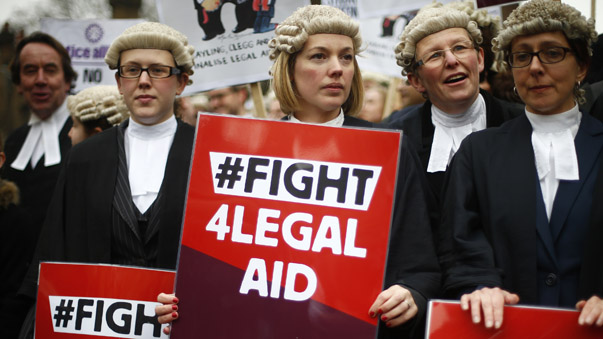Solicitors have been picketing courts since the beginning of the month over government cuts to the legal aid budget. Barristers are due to join in strikes from Monday.
Some lawyers are refusing to take on any new legal aid work, leading to long delays as duty solicitors appointed by the court are swamped with new cases.
Why is the legal profession up in arms?
What is legal aid?
Legal aid was introduced in 1949 under Clement Attlee’s expansion of the welfare state. It covers criminal and civil cases.
Everyone who is arrested for an alleged criminal offence and taken to a police station has the right to free legal advice. But once defendants are charged with a crime they may or may not have their fees paid for by legal aid, depending on their means.
Legal aid budget is also used to help some claimants fight civil cases. There is also a means test and the number of cases that attract aid has shrunk dramatically.
What is the government doing?
The Conservative-led coalition announced a string of reforms designed to bring down the cost of legal aid.
The total bill to the taxpayer was about £2.2bn in 2009/10 and is now expected to fall to around £1.5bn by 2017/18.
The biggest changes are the withdrawal of aid for whole areas of civil law, with some exceptions for the most serious cases.
Civil legal aid has been scrapped for:
– Family cases (except domestic violence, forced marriage or child abduction)
– Immigration (not asylum or detention)
– Housing and debt (where a home is not at risk)
– Benefits cases (except some appeals)
– Most clinical negligence cases
– Most employment cases
The other big cut is to the fees paid by the government to solicitors and barristers for taking on criminal legal aid work.
Lawyers’ fees are incredibly complicated and vary according to the type of hearing, the complexity of the case, the amount of work done and the number of hours worked.
The government has cut solicitors’ fees by 17.5 per cent in total, and barristers’ fees by 6 per cent. Solicitors say the fees have not risen with inflation for decades, so the cut is much greater in real terms.
Other reforms including cutting the number of contracts awarded to law firms who provide duty lawyers for people detained in police stations or appearing at magistrates courts from 1,600 to 527.
This move has attracted bitter opposition from the legal profession, but it does not necessarily mean that the number of lawyers on duty will fall.
Is this really necessary?
The government says we are spending too much on legal aid, compared to other countries.
The latest statistics – commissioned by the Ministry of Justice – show that England and Wales spends £38 per head on legal aid compared to £7 or £8 in Ireland, Canada, New Zealand or Australia.
In another comparison taking in most large EU states, Northern Ireland tops the league table of legal aid spending as a percentage of GDP, followed by England and Wales then Scotland. Most other countries spend significantly less:
Differences in legal systems make it hard to be absolutely fair when comparing spending.
On the other hand, legal aid spending in England and Wales has fallen since 2003, giving the lie to the suggestion that it is “out of control”.
The criminal law caseload has fallen steadily in recent years, as recorded crime has fallen.
And of course it’s not all about money – there’s an argument about whether the cuts will undermine the chance of justice being dispensed fairly and speedily – a principle spelled out in the Magna Carta and in Article 6 of the Human Rights Act.
Who still gets free representation?
As we have seen, the number of civil cases eligible for legal aid has shrunk (here’s an online checker, if you want to find out whether you qualify).
People who want to claim civil legal aid must have a gross monthly income of £2,657 or less.
In criminal cases the eligibility criteria are looser. It must be in the “interests of justice” for a defendant to get representation – a test which covers most serious cases.
And you will only be asked to contribute to the legal costs if you have a disposable income (that’s income minus outgoings like housing and childcare) of £37,500 a year or more.
People claiming certain benefits usually get free representation both in criminal cases and in the remaining civil cases still covered by legal aid. Under-18s also qualify automatically for criminal legal aid.
The proportion of people eligible for civil legal aid had already been falling for decades – from 52 per cent in 1998 to 29 per cent in 2007. It’s not yet clear what that percentage will fall to now
The government insists its reforms won’t affect access to legal representation for the vast majority of people accused of crimes.





